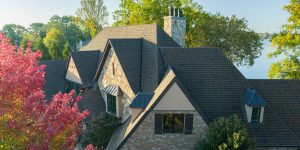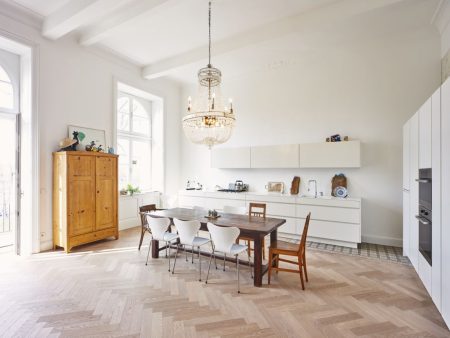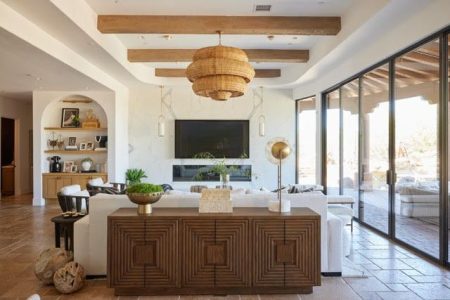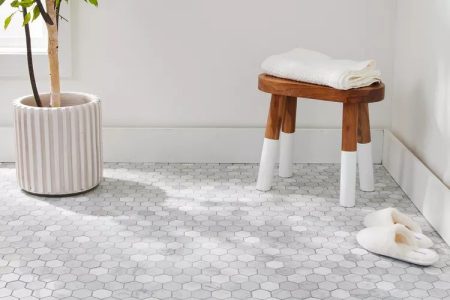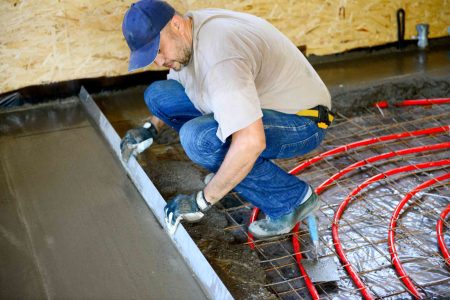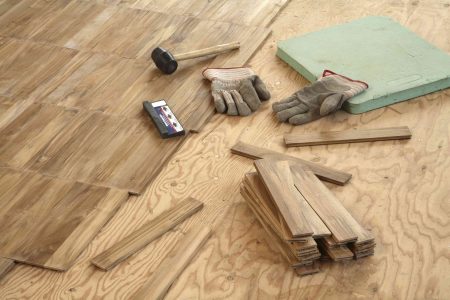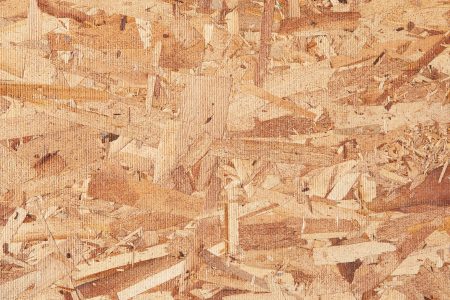LVP and engineered hardwood flooring are both prized for having a hardwood-like look at a lower price point. So, how do you choose between LVP vs engineered hardwood? Learning the key differences between engineered hardwood and LVP flooring, as well as the pros and cons, will help you make an informed choice for your home’s next flooring material.
Below, we’ve compared LVP and engineered hardwood, highlighted their differences, pros and cons, and explained how each flooring option differs from traditional hardwood flooring.
What Is LVP Flooring?
LVP flooring, or luxury vinyl plank flooring, is a multi-layer, plank-style material made from vinyl. The visible portion of LVP flooring consists of a clear protective layer covering a printed image of wood called the design layer, which makes wood-look LVP a convincing imitation of solid hardwood flooring after installation. A layer of aluminum oxide on top protects the flooring from scratches.
The “P” in LVP is there to distinguish LVP from other popular vinyl flooring options like sheet vinyl and vinyl tiles.
Pros and Cons of LVP Flooring
-
Affordable
-
Easy installation
-
Very durable
-
Low Maintenance
-
Ideal for floating floor installation
-
Doesn’t require perfectly level subfloor
-
Hard to remove if glued down
-
Some varieties are prone to fading in sunlight
-
Can dent easily under weight
-
Can’t be refinished
-
Relatively short lifespan
What Is Engineered Hardwood Flooring?
Engineered hardwood flooring is a laminated, plank-style flooring. Most engineered flooring options consist of a wear layer of solid hardwood sitting atop thicker layers of plywood or MDF (medium-density fiberboard).
The hardwood wear layer makes engineered hardwood look nearly identical to solid hardwood, as it’s the only visible portion after installation. The plywood backing gives the planks a thick profile while cutting costs and utilizing materials that may otherwise be wasted.
Pros and Cons of Engineered Hardwood Flooring
-
Looks nearly identical to hardwood
-
Affordable
-
Can be refinished
-
Eco-friendly option
-
Dimensionally stable
-
Long lifespan
-
Can’t handle excessive water
-
Scratches easily
-
Some varieties can fade in sunlight
-
More expensive than LVP
-
Refinishing is limited to wear layer thickness
Main Differences Between LVP and Engineered Hardwood
Both engineered hardwood flooring and LVP flooring can create a beautiful and durable floor to suit a variety of needs. However, it’s the differences between LVP and engineered flooring that will best determine which is right for your home.
The main difference between engineered hardwood flooring and LVP are materials from which they’re made. Engineered hardwood flooring is made out of wood, while LVP is made of vinyl. Naturally, this affects everything from the look and feeling underfoot to the performance and longevity.
Installation
LVP flooring is generally considered easier to install than engineered hardwood flooring. However, if you have the right tools and DIY prowess, both flooring options can be installed without professional help.
The reason vinyl plank flooring has a slightly easier installation is that it can be cut to length with a utility knife. Then, it can be installed as a snap-together floating floor, meaning you don’t have to nail or adhere it to the subfloor in any way. There are click-lock iterations of engineered hardwood as well, but this is typically reserved for thin profile varieties.
Traditional engineered hardwood installation utilizes a tongue-and-groove edge just like its solid hardwood counterpart. This type of engineered flooring is designed to be nailed down or glued down, which adds a small layer of difficulty and increases the installation time substantially.
Warning
Both LVP and engineered hardwood flooring should be allowed to acclimate to an interior environment for at least 48 hours before installation. Failure to do so can result in warping and shrinking after installation, which can cause gaps to form between the planks.
Cost
Engineered hardwood flooring is more expensive than LVP flooring, with average costs ranging from $3 to $20 per square foot. LVP flooring can often be found from $1 to $10 per square foot.
With both flooring materials, you can generally expect a higher price to represent higher performance and a longer lifespan, though this isn’t always the case. On the other hand, spending less may result in a lower resale value.
As mentioned above, many individuals choose to install their own LVP flooring, while engineered hardwood installation is often left to the professionals. This equates to added costs associated with engineered hardwood flooring, as installation can as much as double your price per square foot depending on the market you’re in and the type of engineered flooring used.
Maintenance
LVP is slightly easier to maintain than engineered hardwood flooring, but both flooring options are considered easy to maintain. The cleaning process is generally the same for both types of flooring, as both can be swept, vacuumed, and wet-mopped. However, it’s a good idea to use a minimal amount of water when mopping engineered hardwood flooring.
Whenever attempting to use cleaning agents on LVP and engineered hardwood flooring, always consult the manufacturer’s instructions before using them. If you cannot access the manufacturer’s instructions or are unaware of the manufacturer, always test the product in an inconspicuous area before using it on the entirety of the floor.
Design
Both LVP and engineered hardwood do a fantastic job of mimicking solid hardwood flooring. However, if you’re after the closest imitation of solid hardwood, engineered hardwood has the edge.
In fact, the untrained eye will have a very hard time telling engineered hardwood and solid hardwood apart after installation. This is due to engineered hardwood’s use of solid hardwood. Whereas LVP’s hardwood look comes in the form of a picture, engineered hardwood’s visible layer is actual hardwood.
Whether you choose LVP or engineered hardwood, both materials are available in an array of finishes, wood species, and widths. Most engineered hardwood is pre-finished, but you can buy unfinished engineered hardwood and apply your own finish after installation.
Water Resistance
LVP is more water-resistant than engineered hardwood. In fact, many LVP flooring options are 100% waterproof. This makes them ideal for areas that may see water, such as kitchens, bathrooms, and basements.
Because LVP is made of vinyl, water isn’t a concern for the flooring material itself. The greater concern is water penetrating the flooring and reaching the subfloor. For this reason, waterproof LVP planks are designed to be impenetrable when installed correctly.
Engineered hardwood flooring isn’t waterproof, but most varieties can stand up to water better than solid hardwood. This is due to the plywood layers, which are more dimensionally stable than solid hardwood, meaning they expand and contract less when exposed to water. Still, engineered hardwood shouldn’t be your first choice for areas that see a lot of water.
Longevity
Engineered hardwood flooring lasts longer than LVP flooring due to the fact that engineered hardwood can be refinished once it begins to show unsightly wear and tear, while LVP cannot. This is thanks to the solid hardwood that makes up the visible wear layer at the top of an engineered hardwood plank.
The hardwood wear layer of engineered hardwood can be anywhere from 2mm to 10mm thick. The thicker the wear layer that engineered hardwood flooring has, the more it can be refinished. However, no engineered hardwood can be refinished as many times as solid hardwood, as you’ll eventually sand through the wear layer.
High-quality engineered hardwood flooring that has been properly cared for and professionally refinished could last as long as 50 years or more. Because they can’t be refinished, an LVP floor’s lifespan is determined by how quickly it wears out.
For lower-end LVP options, you shouldn’t expect to get more than 5 to 10 years out of a floor, while higher-end LVP options may last closer to 20 to 30 years.
Durability
Engineered hardwood and LVP are both durable flooring options but in different ways. Engineered hardwood stands up to dents and divots more than LVP, while LVP can often stand up better to scratches.
So, if you have kids or pets with long nails, LVP may be a wiser investment than engineered hardwood. On the contrary, if you need a floor that can hold up to heavy furniture and other objects, engineered hardwood flooring is up to the task.
LVP vs. Engineered Hardwood: Which Is Better?
So, which is better: LVP or engineered hardwood? Neither.
LVP flooring is best for those who need more water resistance or something that can stand up to pets and kids. It’s also ideal for those with a tight budget. Engineered hardwood flooring is best for those who want something that very closely matches the look of hardwood flooring while offering the same underfoot feeling.
Read the full article here



